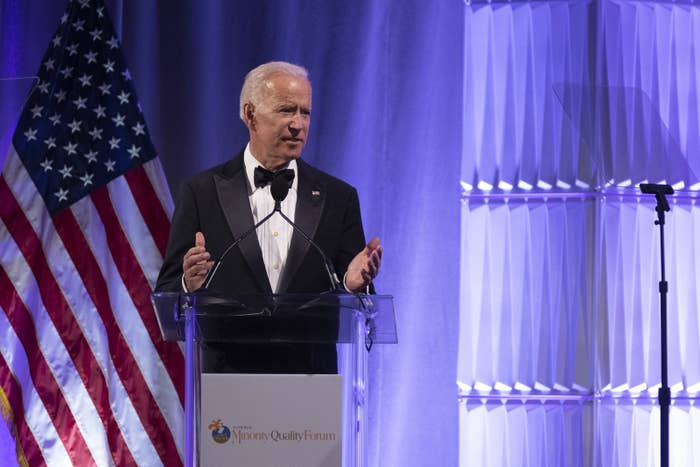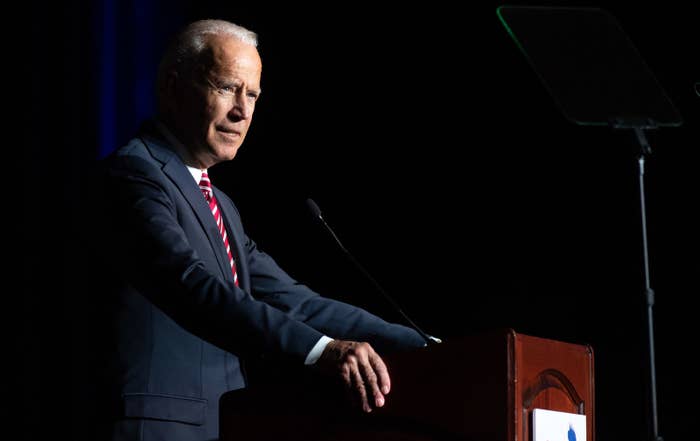
When I decided to come forward with what it felt like to be on the receiving end of Joe Biden’s inappropriate behavior, I knew I would face criticism. I didn’t anticipate that my truth would be so easily manipulated and distorted.
I intended to describe what it was like to be inappropriately touched by a powerful man who would likely declare his presidential candidacy. Instead, I watched as the conversation about my essay, published in the Cut, morphed into a simplistic — and misguided — discussion of hugging in America. I had made it explicitly clear that I didn’t consider Biden’s unwanted intimate touching to be sexual in nature and his behavior to be harassment or assault. Nonetheless, one of the first headlines out of my home state of Nevada inaccurately stated, “Nevada Politician Has Accused Joe Biden of Sexual Harassment.” Other commentators and defenders took it to the other extreme, describing Joe Biden as nothing more than a serial hugger. What everyone missed was that what I was describing — the ease with which Biden physically, and often inappropriately, engages with some of the women around him — is part of the gray area that is being left out of the national conversation launched with the #MeToo movement.
I have repeatedly said that I suspect part of the reason Biden’s inappropriate behavior is not taken seriously is because this kind of behavior, while considered wrong by most people for a very long time, hasn’t been exposed or debated in a public way before. It’s long been public knowledge that Biden has a penchant for getting too up close and personal with women he doesn’t know, but it’s either been treated as a joke by fellow politicos and the media or brushed off as just “Biden being Biden.” In the wake of my essay, Biden said, "Social norms have begun to change.” But the only thing that’s changed is that women are now feeling empowered to call this behavior what it’s always been: wrong and unwanted.
In the days following my essay, character witnesses came forward with their personal versions of “not the Biden I know” stories to underscore just what kind of a well-meaning person Joe Biden really is: Biden is a jovial fellow, a grandfatherly person, an empath, a man who endured much trauma; he didn’t mean anything by it.
These positive character reviews are probably all very true, but entirely irrelevant to the women on the receiving end of his unwanted expressions of well-meaning affection. These actions weren’t just hugs. I agree that next to “hugger” in the dictionary, Joe Biden flashing his million-dollar smile should be entered next to it. But in my case, Biden’s version of a friendly hug was his hands on my shoulders, his body close to mine, from behind, smelling my hair and planting a slow kiss on my head when we had no personal relationship whatsoever and just minutes before a stressful, high-profile public event.
For the other women who also had no previous personal relationship with Biden, it was his hand on the thigh of a sexual assault victim just minutes after disclosing her trauma at an It’s On Us event. It was Biden pulling in close to the face of a young sexual assault survivor while holding her hands. Biden pulling a woman’s face by the back of her neck to his own, so suddenly that she was horrified that he was about to kiss her. Characterizing this behavior as everyday, run-of-the-mill friendliness is grossly inaccurate, and whether they knew it or not, every last public commentator who referred to Biden as just being a “hugger” participated in the classic strategy of discrediting women who speak out against powerful men by minimizing the behavior.
I listened and watched as debates began to rage over hugging. To hug or not to hug. Pictures of me casually touching colleagues, friends, and family in social settings such as selfies began to circulate the dark corners of social media. Even conservative commentator Tucker Carlson came to Biden’s defense for what he described as “hugging people wrong.” It was clear that the minimization strategy was at least partially effective. Biden himself said he’d never “thought of politics as cold or antiseptic,” implying that those of us who didn’t give him permission to behave as if we’ve been intimately acquainted for years must be frigid robots.
While at times it seemed like the conversation I started had gone entirely off the rails, I also knew that in the short and long term, we would get back on track. I knew this because every day I heard from women who recalled the instances when bosses, colleagues, or strangers subjected them to the same type of unwanted, inappropriate behavior. And I also heard from men who immediately knew that they would never violate a woman’s space and bodily autonomy in that way, and if it were easy for them to refrain from acting that way, then Joe Biden and other powerful men could refrain from doing it too.
What became very clear to me then was that this wasn’t only about minimizing serious behavior for the purpose of defending a very well-liked political figure. It was also very clear that a long overdue conversation about basic consent was necessary.

The conversation further devolved from offensive “hugging” to totally disconnected emphatic proclamations that Biden’s behavior wasn’t sexual assault — no one who spoke about their own experiences had ever said it was. In listening to these puzzling statements, it struck me that the commentators were casually dismissing the core #MeToo tenet of consent. By saying that the conversation about bodily autonomy and less serious transgressions were “cheapening the #MeToo movement” or diminishing the trauma of “real victims,” the commentators were both lacking in understanding of the power dynamics between powerful men and less powerful women, and lacking in empathy for the very real burdens women are forced to carry due to less offensive but still unwanted behavior.
Imagine my relief when the original founder of the #MeToo movement Tarana Burke in a series of tweets stated, “People have been asking me all week if what Lucy Flores experienced was worth coming forward about. My answer is YES. I support her wholeheartedly.” She also noted, “It’s not that people become more ‘sensitive’ over time as Biden suggested. And it’s not just about personal space or intention - it’s about bodily autonomy, it’s about power and leadership, and it’s about living into who we say we are and who we want to be.”
Several other commentators began to weigh in to describe the kind of tax that accumulates over time when women are subjected to behavior like Biden’s. Nelini Stamp, the national organizing director of the Working Families Party, wrote, “But understand too that women already spend our entire lives fully conscious of our bodies, how we move through space and how we interact with others. We are constantly questioning our movements, recalibrating our posture, shifting our size and our presence based on who we are around and how they might feel. We are hyperaware of our physicality and the space around us. Men, now it’s your turn.”
Yet I watched as other Biden defenders selectively applied their #MeToo distress — like Alyssa Milano, who tweeted, “Joe Biden’s response that he never meant to make anyone uncomfortable and that he'll listen and learn from anyone who says otherwise is exactly the leadership we need to build a culture where women are heard and are equal.” Speaking at a public event in the wake of the allegations, Biden proceeded to make fun of the whole situation in a union hall full of mostly white older men, joking that he had “gotten permission” to hug some people there. Hearing him joke about a serious situation and then hearing hundreds of men laugh about it was exactly the type of humiliation that women face in these situations. And Biden did it just a day after he swore that he would listen and that he would learn. Milano didn’t utter a word asking for accountability.
These varied responses to how Biden handled the situation have made it clear that the #MeToo movement has reached another pivotal moment — one where we are now forced to react to men who behave poorly but whom we also happen to really like, and to what degree we hold the men we like accountable. It was so much easier when #MeToo was limited to men who committed atrocious acts of sexual assault, or to political foes who deserve to be villainized for their clearly vile and illegal behavior. It appears it is much more complicated when it comes to demanding basic respect — and consent — from all the men around us.
I have been asked often if Biden’s inappropriate behavior with women disqualified him for office. I have repeated over and over again that this behavior, plus my other critiques of Biden’s record, including his recent comments about the way he handled the Anita Hill hearings (saying “I wish I could have done something” as if he’d forgotten that, as chair of the committee, he was free to do anything he wanted) demonstrated to me that despite all of the good things Biden has done for women, he was still unwilling to take responsibility for the bad things he’s done. Add his on-again, off-again relationship with a woman’s right to choose to have an abortion, his role in passing a crime bill that led to millions of mostly black and brown incarcerated bodies, and his vote to gut welfare mercilessly kicking mothers with low incomes off assistance, among a lengthy list of additional issues, and for me, the answer is yes, this is disqualifying and I don’t think he should run. I have also emphatically stated that ultimately it was up to individuals to assess if the totality of his history made him worthy of their vote.
If Biden decides to run, his entire history will be vetted by voters just like any other candidate. And the #MeToo movement will have to decide two things: to what degree we’re willing to have a discussion about basic respect and consent; and whether we hold everyone accountable, no matter how little or how much we personally like them. As a society we gain nothing by calling out the disgusting behavior of someone like Donald Trump while allowing far less vulgar but still harmful behavior like Biden’s get a pass.
I’m all for being fair arbiters of bad behavior. We all make mistakes. We should all be given the opportunity to learn and grow from those mistakes. I probably wouldn’t be writing this article if Biden had just taken the leadership opportunity that was presented to him by taking responsibility, apologizing, then urging all other men to reflect on their own potentially offensive and inappropriate behavior. The most ironic thing about this whole situation is that the It’s On Us campaign that Biden has recently championed has tools that include messages like “It’s on us to stop victim blaming” and “Consent. If you don’t get it, you don’t get it.”
Consent doesn’t just apply when sex is involved. Consent also applies when you’re invading a woman’s space and touching the body of a woman you don’t know. Biden has never apologized to Anita Hill, and it appears he will never apologize to me or the other six women who came forward with their own stories. Another useful message from the It’s on Us campaign feels appropriate: “It’s on us to always do the right thing.”
Lucy Flores is a social justice advocate, CEO of Luz Collective, and a former Nevada assemblywoman.
